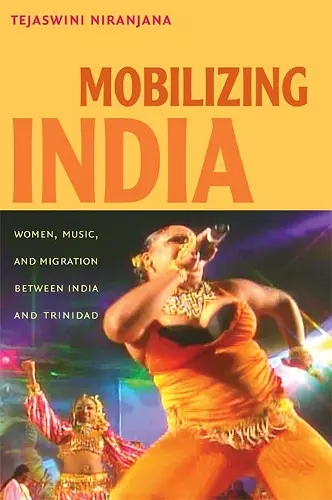Mobilizing India
Women, Music, and Migration between India and Trinidad
Format:Hardback
Publisher:Duke University Press
Published:12th Oct '06
Currently unavailable, and unfortunately no date known when it will be back

A South-South perspective on how the mobilization of citizens within Trinidad and India has affected female identities.
An innovative analysis of how ideas of Indian identity negotiated within the Indian diaspora in Trinidad affect cultural identities "back home" in India.Descendants of indentured laborers brought from India to the Caribbean between 1845 and 1917 comprise more than forty percent of Trinidad’s population today. While many Indo-Trinidadians identify themselves as Indian, what “Indian” signifies—about nationalism, gender, culture, caste, race, and religion—in the Caribbean is different from what it means on the subcontinent. Yet the ways that “Indianness” is conceived of and performed in India and in Trinidad have historically been, and remain, intimately related. Offering an innovative analysis of how ideas of Indian identity negotiated within the Indian diaspora in Trinidad affect cultural identities “back home,” Tejaswini Niranjana models a necessary project: comparative research across the global South, scholarship that decenters the “first world” West as the referent against which postcolonial subjects understand themselves and are understood by others.
Niranjana draws on nineteenth-century travel narratives, anthropological and historical studies of Trinidad, Hindi film music, and the lyrics, performance, and reception of chutney-soca and calypso songs to argue that perceptions of Indian female sexuality in Trinidad have long been central to the formation and disruption of dominant narratives of nationhood, modernity, and normative sexuality in India. She illuminates debates in India about “the woman question” as they played out in the early-twentieth-century campaign against indentured servitude in the tropics. In so doing, she reveals India’s disavowal of the indentured woman—viewed as morally depraved by her forced labor in Trinidad—as central to its own anticolonial struggle. Turning to the present, Niranjana looks to Trinidad’s most dynamic site of cultural negotiation: popular music. She describes how contested ideas of Indian femininity are staged by contemporary Trinidadian musicians—male and female, of both Indian and African descent—in genres ranging from new hybrids like chutney-soca to the older but still vibrant music of Afro-Caribbean calypso.
“Tejaswini Niranjana listens to the tones and echoes of Indianness in the Caribbean and elaborates a South–South genealogy that obligates us to reconceive the cultural geography of modernity. From the ‘moral status of the coolie woman’ in British colonialist and Indian nationalist discourses to the figure of the ‘Indian woman’ in Afro-Trinidadian calypso, Hindi cinema musics, and female chutney-soca performances, she pronounces the gendered rhythms of popular music as subaltern cultural politics.”—Lisa Lowe, author of Immigrant Acts: On Asian American Cultural Politics
“Tejaswini Niranjana’s fine achievement in Mobilizing India is to have given shape to a compelling way of rethinking the conceptual agenda for the comparative study of the Third World.”—David Scott, author of Conscripts of Modernity: The Tragedy of Colonial Enlightenment
“Mobilizing India. . . is a sophisticated, well-written, and engaging book which does indeed-as promised- provide a model for comparative cultural research across the global South. Those interested in Caribbean cultural studies, in the development of popular music in postcolonial societies, in identity and gender politics in a multiracial polity, will all find much that is valuable and original in this book.” -- Bridget Brereton * Canadian Journal of Latin American and Caribbean Studies *
“Niranjana . . . has written a sophisticated study of women, diasporic dynamics, and ethnic identity in Indo-Trinidadian society, using popular music as a lens though which to view these. . . . Her book is certainly recommended reading for students and scholars of South Asian diasporas and Caribbean studies.” -- Peter Manuel * Ethnomusicology *
ISBN: 9780822338284
Dimensions: unknown
Weight: 558g
288 pages